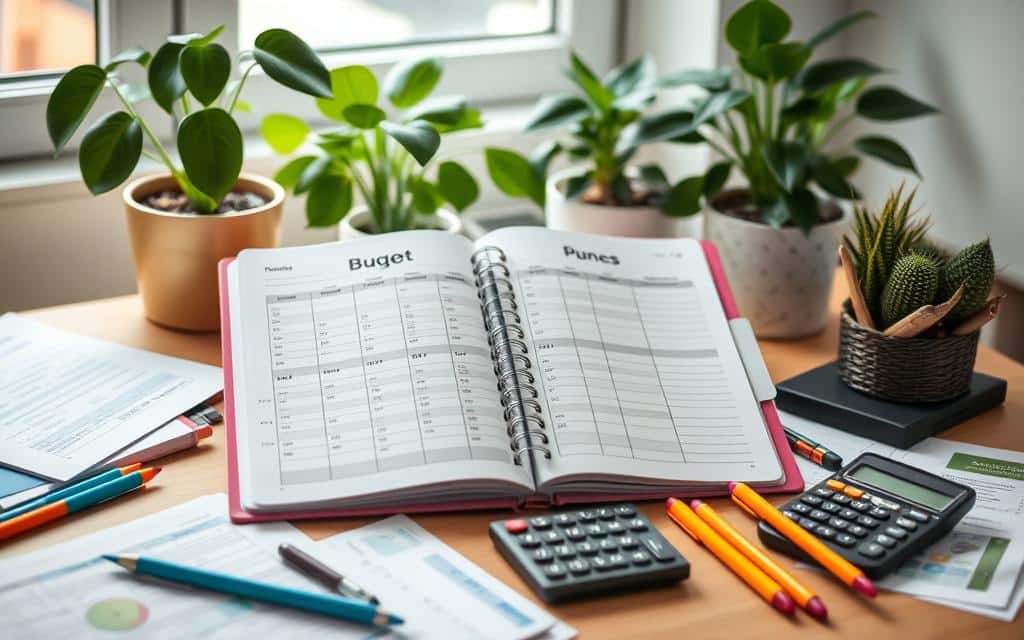Anúncios
Creating a monthly budget is key to managing your money. It helps you see how much you earn versus how much you spend. This way, you can make smart choices about your money.
It’s not just about keeping track of your spending. It’s also about setting financial goals and planning how to reach them. By making a good budget, you can save money and feel secure about your finances.
Understanding the Importance of a Monthly Budget
Creating a monthly budget is key for financial stability. It acts as a guide for managing expenses. This helps individuals and families navigate their finances with confidence. It leads to better financial health in the short and long term.
Benefits of Budgeting for Individuals and Families
Budgeting helps build good financial habits. It offers several benefits:
- Increased Savings: It allows for setting aside money for emergencies or investments.
- Improved Cash Flow Management: Tracking income and expenses helps make better spending choices.
- Reduced Financial Stress: A clear budget reduces worries about money and avoids unexpected debts.
- Shared Goals within Families: Budgeting encourages families to discuss and work towards common financial goals.
How Budgeting Affects Financial Health
Good budgeting can significantly improve financial health. It helps by cutting down on unnecessary spending and boosting savings. This way, individuals can:
- Reduce Debt: A budget helps focus on paying off debts, leading to financial freedom.
- Enhance Savings Capacity: Setting aside specific amounts for savings builds discipline and a saving culture.
- Improve Overall Financial Literacy: Working with a budget increases understanding of financial concepts.

Steps to Create a Monthly Budget
Creating a monthly budget is a structured process. It helps you manage your money better. By following these steps, you can reach your financial goals.
Gather Your Financial Information
The first step is to gather all your financial data. You need to know your income, like your salary and bonuses. Also, list your expenses, including fixed costs like rent and variable costs like groceries.
Having a clear view of your finances is key. It makes creating your budget easier.
Categorize Your Expenses
Next, sort your expenses into fixed and variable costs. Fixed costs stay the same every month. Variable costs change.
Using a budget tracker helps organize your expenses. It shows where your money goes. This way, you can find areas to save and adjust your budget.
Set Your Financial Goals
Lastly, set both short-term and long-term financial goals. Short-term goals might be saving for a trip or paying off debt. Long-term goals could be buying a home or saving for retirement.
Defining your goals gives your budget purpose. It helps guide your spending and improves your financial health.
| Step | Description | Benefits |
|---|---|---|
| Gather Your Financial Information | Collect all data on income and expenses. | Gives clarity on financial situation. |
| Categorize Your Expenses | Organize expenses into fixed and variable categories. | Helps identify savings opportunities. |
| Set Your Financial Goals | Define short-term and long-term financial objectives. | Provides motivation for budget adherence. |
Tools and Resources for Budgeting
Finding the right tools and resources can make a big difference in managing your finances. There are many options, from high-tech apps to old-school methods like spreadsheets and handwritten ledgers.
Budgeting Apps Available in South Africa
Many budgeting apps are made for South African users. Apps like MoneySmart and AndroMoney help track expenses and set financial goals. They make it easy to keep an eye on income and spending, helping individuals and families stay on budget.
Spreadsheets and Templates
For those who like to customize, spreadsheets and templates are great. Microsoft Excel offers many templates that can be tailored to fit your financial needs. A personalized spreadsheet lets you track expenses in detail, which is key for controlling your finances.
Offline Options for Budgeting
Some people prefer not to use digital tools for budgeting. Handwritten ledgers or printed templates are good alternatives. They allow users to track spending without needing a phone or computer. Offline methods can help you stay hands-on with your budget, making it easier to manage your money.
| Tool Type | Examples | Ideal For |
|---|---|---|
| Budgeting Apps | MoneySmart, AndroMoney | Tech-savvy users |
| Spreadsheets | Microsoft Excel Templates | Customizable tracking |
| Offline Options | Handwritten Ledgers | Traditionalists |
Tracking Your Spending
Watching your expenses is key to good expense management. It helps keep your budget in check and shows where you might spend too much. By tracking your spending, you can make smarter choices and save money.
The Importance of Tracking
Logging your expenses regularly has many benefits:
- It makes you more aware of how you spend money.
- You can spot unnecessary costs.
- It helps you control your finances better.
A good budget tracker makes it easy to use, whether on your phone or computer.
How to Log Expenses Effectively
There are several ways to track your expenses well. Here are some practical tips:
- Use budgeting apps like YNAB or Mint for detailed tracking.
- Keep a physical notebook if you like writing.
- Try spreadsheets to organize your expenses and see trends.
Each method has its own benefits for managing expenses and saving money. Pick one that fits your style for better results.
| Method | Benefits |
|---|---|
| Budgeting Apps | Real-time tracking and automatic categorization |
| Notebook | Tactile engagement; promotes reflection |
| Spreadsheets | Customizable; detailed analysis of spending |
Adjusting Your Budget
Being flexible is key when planning your budget. Your financial situation can change for many reasons, like unexpected bills or income changes. Knowing when to adjust your budget can help you reach your financial goals.
Recognizing When Adjustments Are Needed
There are signs that tell you it’s time to change your budget:
- An increase in regular expenses, such as rent or groceries.
- Unexpected medical bills or car repairs that disrupt your planned spending.
- A drop in income due to job loss, reduced hours, or other financial hardships.
- Life changes like marriage, having a child, or moving that alter your financial landscape.
Tips for Modifying Your Budget
Changing your budget needs careful thought. Here are some tips for making effective changes:
- Prioritize Essential Expenses: First, pay for things you really need like housing, utilities, and food.
- Create a Buffer: Add a small extra amount in your budget for costs that can change each month, like bills and groceries.
- Review Your Financial Goals: Check your financial goals often and adjust them if needed. Make sure they’re still reachable.
- Track Your Progress: Keep an eye on how you’re spending. Adjust your budget as needed to meet your goals.
| Expense Type | Monthly Budget | Adjusted Amount |
|---|---|---|
| Rent/Mortgage | $1,200 | $1,200 |
| Groceries | $300 | $350 |
| Utilities | $150 | $180 |
| Transportation | $200 | $220 |
| Entertainment | $100 | $50 |
Common Budgeting Mistakes to Avoid
Knowing common budgeting mistakes can really help with managing your money. Many people make errors that can mess up their financial plans. It’s important to be careful about these mistakes to budget well. Here are two common mistakes to avoid when trying to save money.
Overlooking Small Expenses
Many overlook small expenses, thinking they don’t matter much. But, these small costs can add up fast, causing unexpected money problems. Keeping track of every expense, big or small, helps you understand your financial situation better.
Being Unrealistic with Income and Expenses
Guessing your income and expenses wrong is a big challenge in making a budget. If you guess too high on income, you might spend too much. Guessing too low on expenses means you’ll have to adjust your budget often. It’s key to use careful estimates based on past spending. This way, your budgeting will be both effective and lasting.
Staying Committed to Your Budget
Keeping up with your budget is key to long-term financial success. Using reminders and alerts can help keep your financial goals in mind. A budget tracker, like an app or calendar notifications, helps you stay on track.
These reminders gently guide you away from impulse buys and towards your goals. It’s like having a personal coach for your money.
Having someone to hold you accountable is also important. Friends or family with similar financial goals can offer support and motivation. Sharing budgeting progress in group chats or meetings can make the journey more fun and less lonely.
Don’t forget to celebrate your financial wins. Small victories can boost your motivation and reinforce good habits. Treating yourself for staying on budget can make money management more enjoyable.
This mix of strategies not only keeps you committed but also builds a strong budgeting mindset. It’s all about finding a balance that works for you.



